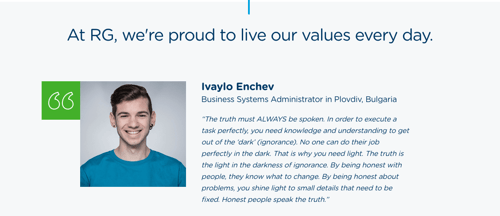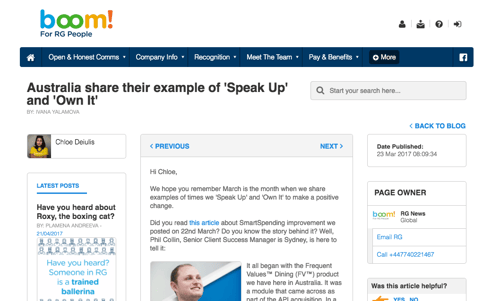If your company has been around for awhile, building on success can seem challenging — why fix what’s not broken, right? But if your organisation has grown stagnant, it’s time to shake things up.
Innovation is vital for survival in our fast-paced, hypercompetitive economy. It enables companies to thrill their customers, expand into new markets and grow their brand. And it’s critical to growing employee engagement at your business.
Its importance can best be summed up in this quote, from founding partner of WorkXO Jamie Notter:
Innovation is change that unlocks value.
We’ve talked here before about what a disengaged employee looks like, and issues with employees feeling like a cog in a wheel. Ask yourself: Does it seem like employees show up to work, do what’s expected of them, but don’t really push themselves into new territory? If so, don’t blame your employees so quickly. Your organisation may be missing key ingredients needed to foster a culture of innovation.
For innovation to take hold, employees have to care about the company’s success — and that’s one of the drivers to creating an engaged workforce.
Think of innovation as a ladder: Each small step taken makes a difference, but the further up you climb, the closer you’ll get to a truly innovative culture, and what’s ultimately the bigger prize
.
1. Align company values
The first step toward innovation must be taken by management. One of your employees could have a billion-dollar idea, but it will never come to fruition unless company leaders align the organisation’s values to not just foster new ideas, but execute them.
Adopting values that define your organisation’s commitment to innovation are crucial to creating an innovative culture — it’s one of the biggest reasons we have our Speak Up value. Core innovation values you may want to integrate include individuality, creativity, accountability and trust.
2. Communicate your mission
So you’ve included innovation in your organisation’s values or mission statement. But does anybody know about it? Real innovation can’t take place unless you communicate the mission, and that communication must be constant and transparent. Mention innovation in every employee message (yes, even the posters above the toilets), but do so in a simple, meaningful way that inspires employee creativity.
Showcase what individuals and departments are doing outside the box that other employees may not know about, and tell real stories on accessible forums like your employee engagement platform that demonstrate significance, not just facts and figures. Here’s an example of what we did to communicate our values “Speak Up” and “Own It” to the 350+ people at Reward Gateway. By sharing the success of some of our moments living out values, we encourage others to do the same:

3. Hire innovators
Let’s face it, not all workers are wired to innovate. So you need to reframe your organisation’s hiring practices to identify and recruit people who think differently. In job design, catering to innovation within job roles might mean allowing employees to spend a portion of their time working on self-selected projects and encouraging open and honest communication and aren’t afraid to call out things that might be broken — it helps improve your product, and your processes.
You could also include innovation exercises in the hiring process that test candidates’ capacity to think creatively. Some companies are appointing Chief Innovation Officers whose responsibilities include recognising and supporting innovative ideas pitched by members of the team.

4. Provide collaborative tools
Innovators need to engage with others to gain new insights and develop their ideas into fully realized products. And they need a place to do so. Your organisation could launch an idea wiki or an ideas bank that allows employees to post, discuss and refine ideas (we use Slack, which is a great tool for collaboration), or form groups outside of normal working hours to brainstorm. For instance, we recently held a “Hackathon” as part of our quarterly meeting where each team had to present a solution to a problem — some worked on global communications, others streamlined travel expenses or came up with onboarding ideas. The possibilities are endless.
5. Recognise achievements
Everyone appreciates a simple “thank you.” And while bonus payments are nice, too, in order to truly foster an innovative culture, organisations must create a substantial employee recognition programme that rewards innovation throughout the year.
You could launch a creative rewards program that features a silly trophy passed among the most innovative teammates, incorporate innovation in quarterly recognition initiatives, or create a points system in which points awarded for fresh ideas can be traded in for corporate swag, iPads or extra holiday time.
Innovation should also be shown from the top-down with leaders who recognise employees who add to an organisation’s innovation and successes.
Lastly, hosting regular innovation fairs is another way to highlight new concepts and spur some friendly competition among your staff.
As you can see, there are more than just five ways to foster a culture of innovation and improve employee engagement. So tell us, how do you inspire innovation in your organisation?
 Robert Hicks
Robert Hicks



